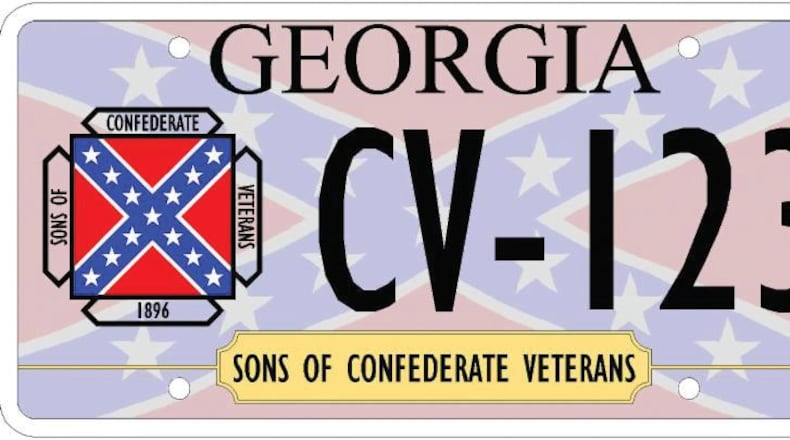The state of Georgia has released a new specialty license tag that features the Confederate battle flag, inflaming civil rights advocates and renewing a debate on what images should appear on state-issued materials.
The new specialty tag has stirred a clash between those who believe the battle flag honors Confederate heritage and those, particularly African-Americans, who view it as a racially charged symbol of oppression.
A spokesman for the Southern Christian Leadership Conference said Tuesday that the state should not have sanctioned the battle emblem to appear on a Georgia tag.
“To display this is reprehensible,” said Maynard Eaton. “We don’t have license plates saying ‘Black Power.’”
For their part, the Georgia Division of the Sons of Confederate Veterans said it meant no offense. People have a right to commemorate their heritage, and the state would be discriminating if it rejected the group’s application, said spokesman Ray McBerry.
“By sanctioning the plate, they are not saying they agree with our organization. They’re just saying it’s a level playing field,” he said.
The Motor Vehicle Division of the state Department of Revenue, approves proposed designs for specialty plates. It did not respond to questions from The Atlanta Journal-Constitution about what criteria it uses in making those determinations, except to say, via email, that they cannot violate copyright laws.
Gov. Nathan Deal said the new tag was a surprise to him.
“I hadn’t heard that so I don’t know anything about it. I’ll have to talk to them about it. I had no information in advance about it,” said Deal, who last month vowed to a Ebenezer Baptist Church congregation that he would give Martin Luther King Jr. a more prominent place on state Capitol grounds.
In a related context — applications for vanity plates submitted by individuals — Georgia law charges the motor vehicle agency with exercising discretion when it comes to racially sensitive matters. The law prohibits vanity plates judged to ridicule any race or ethnicity.
The state also denied a 2012 request by a Ku Klux Klan chapter to “adopt” a highway in north Georgia to help clean it. The chapter then sued the state.
The new Confederate flag plate replaces one that was already in circulation. The new design places the St. Andrew’s flag in the background across the entire tag. Like the old plate, it also features the flag in the square logo of the Sons of Confederate Veterans. It adds the organization’s name across the bottom of the tag, where the name of the issuing county typically appears.
The state sold a total of 439 of the earlier version in the last two years. There are 35 orders already for the new tag, according to the Revenue Department.
The cost of the tag is $80. Ten dollars from the fee goes to the Georgia Division of the Sons of Confederate Veterans. The group said it uses the money to promote education efforts and preservation of statues, monuments and other historic items.
Passions aroused by the Confederate flag remain a potent force in Georgia politics. When Gov. Roy Barnes brought down the 1956 state flag, which had the emblem as its centerpiece, the backlash contributed to Sonny Perdue’s surprise election as governor.
Elsewhere, states that joined the Confederacy have taken different postures in regard to the symbol. North Carolina, Alabama and Mississippi have specialty license tags that include it. Texas’ rejected an application to issue one, on the grounds that it would offend many residents.
The Texas Division of the Sons of Confederate Veterans sued board members of the Texas motor vehicle agency, and the case remains in the courts.
McBerry, of the Sons of Confederate Veterans, was unfazed by the renewed controversy over the battle flag. “We believe that everyone has the right to preserve their heritage,” he said. “Southerners have as much right to be proud of their heritage as anybody else.”
Eaton, of the Southern Christian Leadership Conference, said issuance of the tag confirms his belief that the state government is indifferent to the 31 percent of residents who are black.
“It’s a slap in the face,” he said.
About the Author
Keep Reading
The Latest
Featured


